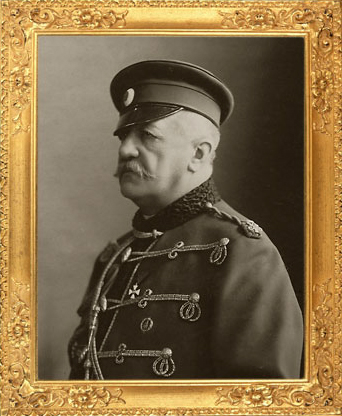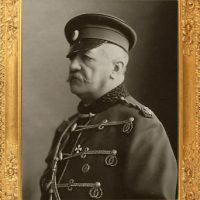Illarion Ivanovich Worontsov-Dashkov
The son of Ivan Illarionovich Worontsov (1719-1786), who is the uncle of M.S. Worontsov.
Count Illarion Ivanovich Worontsov-Dashkov (1837-1916) was a Russian statesman and military figure. One of the largest landowners in Russia, the owner of a large number of industrial enterprises.
He was born on May 27, 1837 in St. Petersburg. The son of a member of the State Council, the chief of Ceremonies, the actual privy councilor (D.T.S.) of Count Ivan Illarionovich Worontsov (1790-1854), who was M.S. Worontsov’s second cousin.
In 1855, he entered Moscow University, but the next year he transferred to military service, joining the Life Guards Cavalry Regiment as a volunteer; on March 25, 1858, he was promoted to cornet.
Participant in military operations in the Caucasus in 1859-1862
. 1860 — promoted to lieutenant for military distinction with seniority from 17.09.1859.
Since 09/21/1861 — Staff captain.
11/17/1862 — promoted to captain for military distinction and granted to the adjutant wing.
In 1865, with the rank of colonel, he was sent to serve in Turkestan with General D. I. Romanovsky as chief of staff. On October 2, 1866, commanding the southern group consisting of three assault columns, he distinguished himself during the capture of the Bukhara fortress of Ura-Tube, and on October 18 he took a direct part in the storming of Jizzakh. On October 28, 1866, he was promoted to Major General and appointed assistant to the military governor of the Turkestan region. For military distinctions during military operations in Turkestan, he was awarded the Order of St. George, 4th degree (1867). After the appointment of K. P. von Kaufman’s Turkestan Governor-General Worontsov-Dashkov left Central Asia and returned to St. Petersburg.
From October 15, 1867 to October 21, 1874 — commander of the Life Guards Hussar Regiment, simultaneously from October 2, 1873 to October 21, 1874 – commander of the 2nd Brigade of the 2nd Guards Cavalry Division. From October 21, 1874 to July 23, 1878, the chief of Staff of the Guards Corps (on August 30, 1876, he was promoted to lieutenant General), at the same time he was a member of the Committee on the Organization and Education of Troops (27.10-1.12.1894) and the Council of the Main Directorate of the State Horse Breeding (1.12.1874—12.10.1878).
During the Russian-Turkish war of 1877-1878, he commanded the cavalry of the Ruschuk detachment (the heir to the throne, the future Emperor Alexander III, was at the head of the detachment). From October 12, 1878 to April 8, 1881, he was the head of the 2nd Guards Infantry Division.
In March 1881, Worontsov-Dashkov organized a kind of secret society (which was supposed to protect the personality of the emperor and fight “sedition” by secret means) called “Voluntary Protection”, then renamed the “Sacred Squad”, which was joined by quite a few high-ranking officials (Pobedonostsev, Ignatiev, Katkov).

With the accession of Emperor Alexander III to the throne, he was called to the post of chief chief of the Emperor’s guard, and on June 1, 1881, he was appointed chief of the state horse breeding, which was then restored as an independent department, and on April 27, 1882 received a new position and staff. The count was prepared for this position by his previous activities as Vice-president of the Imperial Tsarskoye Selo Racing Society and president of the Imperial St. Petersburg Trotting Society.
During the management of this department, he opened 8 new factory stables, all state—owned factories were improved, many new producers were acquired, the output of Russian horses abroad doubled (in 1881, 23642 were withdrawn, and in 1889 – over 43,000); the activities of trotting and racing societies were expanded, measures were taken to more correctly issue certificates trotting horses, the beginning of the preventive vaccination of the vaccine of infectious diseases to pets, according to the Pasteur method; Agriculture was established at the Belovezhsky and Khrenovsky plants, and a large amount of land was cultivated and sown; at the Khrenovsky plant, a school of horsemen was established, on the initiative and at his personal expense. On August 17, 1881, he was appointed Minister of the Imperial Court, estates and Chancellor of the Russian Imperial and Tsarist Orders, leaving him in charge of the state horse breeding.

He has made significant changes in all these institutions. In the Ministry of the Imperial Court, before his appointment, there were still ancient states, according to which collegial institutions were in charge of economic activities, with high-ranking officials at the head and a lot of small officials with the most insignificant content. Proceeding from the idea that collegiality is inappropriate in economic matters requiring efficiency and personal initiative, he introduced all collegiums to be abolished, replaced them with new simplified institutions and at the same time strengthened control over the activities of the economic bodies of the ministry. On the same basis, the institutions of the specific department have been transformed, in which other significant innovations have been made.
In 1885, its own insurance of specific assets was established by deducting insurance premiums previously paid to insurance companies into a special specific insurance capital, which exceeded 400,000 rubles. In addition, the conversion of specific capitals into land ownership was undertaken, as a result of which 262,286 tithes were purchased in 17 provinces, mainly in the central part of Russia, in the amount of 15,407,021 rubles. From the state property, the Belovezhskaya Pushcha with the Svisloch forest cottage adjacent to it, received a total of 114,993 tithes, according to the promenade. Such a significant expansion of land ownership caused an increase in the number of local unit administrations, namely: the establishment of the Kirilovsky and Belovezhsky unit administrations and the Saratov unit office.
During the same period of time, viticulture and winemaking received special development in the specific estates. In 1889, the appanage department acquired, together with the estates of Massandra and Aydanil, the entire wine trading business under the firm of Prince S. M. Worontsov. In the appanage estates in the Crimea and the Caucasus, the area occupied under vineyards reached 558 dessiatines; special departments were established for the management of these estates, under the direct supervision of the Department of allotments, of which 4 in the Caucasus and one in the Crimea. In 1887, the management of the Murghab state estate in the Transcaspian region was transferred to the Department of estates.
30.08.1890 — promoted to general of the cavalry.
1893 — appointed Chairman of the Committee to consider submissions for awards.
27.10.-1.12.1894 — as a member of the Committee on the Organization and Formation of troops.
In the spring of 1896, as the Minister of the Imperial Court, he was entrusted with all the orders for preparing for the celebrations of the coronation of Emperor Nicholas II.
On May 6, 1897, he was dismissed from the post of chief executive and minister and appointed a member of the State Council.
On February 27, 1905, he was appointed Governor of the Caucasus, commander-in-chief of the Caucasian military and military commander of the Caucasian Cossack troops. During the revolutionary movement in the Caucasus (1905-1906), he took a number of harsh measures to suppress it, but did not satisfy either the Black Hundred press or the right-wing members in the State Duma, who accused him of “indulging” foreigners and revolutionaries.
With the outbreak of the First World War, on August 30, 1914, he was appointed Commander-in-Chief of the Caucasian Army. He practically did not take part in the development of operations and the leadership of the troops, handing over the command of the army to General A. Z. Myshlaevsky, after his removal to General N. N. Yudenich. Worontsov-Dashkov was responsible for the issues of the army’s rear. However, despite this, on July 15, 1915, he was awarded the Order of St. George, 3rd degree. On August 23, 1915, he was relieved of command of the army and appointed to a specially established position for him — “to be with the Person of His Majesty.”
He died on January 15, 1916 in Alupka. He was buried in the family estate, at the Annunciation Church in Novotomnikovo village, Shatsky district (now Morshansky district, Tambov region).

«This is perhaps the only one of the heads of the region who, during the entire revolution, at a time when someone was killed or a bomb was thrown at someone every day in Tiflis, calmly drove around the city both in a wheelchair and on horseback, and during all this time not only did not attack him Attempts have been made, but even no one has ever insulted with a word or gesture».
From the memoirs of S.Y. Witte
